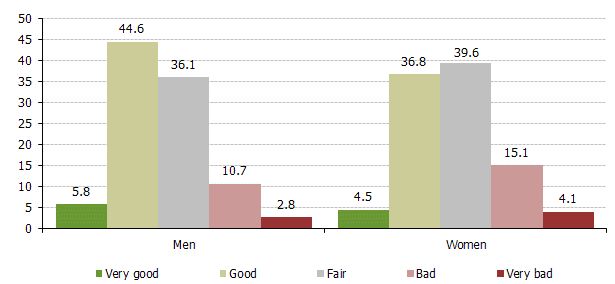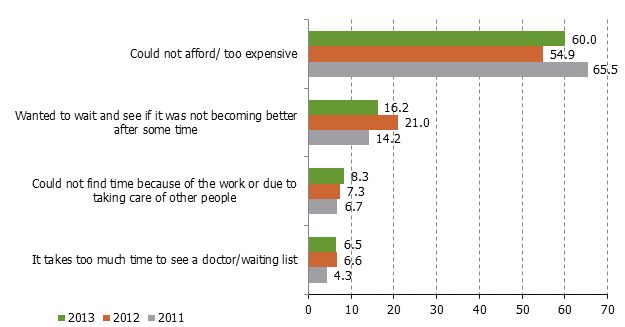Analytics, EU – Baltic States, Lithuania, Markets and Companies, Medicine, Society
International Internet Magazine. Baltic States news & analytics
Thursday, 25.04.2024, 03:41
45% Latvian population assess their heath as good or very good
 Print version
Print version
Despite the fact that only 5.1% assessed their state of health as very good, the majority or 40% considered that their health was good and 38% as fair. 13% responded that their health condition was bad and 3.5% – very bad. This self-assessment does not differ much from the last-year's results.
The answers on health self-assessment given by men slightly differed from those provided by women. Men evaluated their state of health more optimistically than women.
 |
| Answers to question "How do you perceive your general health status?” in 2013 (in %) |
Data source: Central Statistical Bureau of Latvia
The most optimistic self-perceived health was recorded among young people aged 16-24. 84% of them perceive their health as good or very good. In its turn, the lowest health assessment was recorded among respondents aged 65 and over. 43% of them perceive their health as bad or very bad.
In 2013 a positive answer to the question ‘’Do you have any chronic illness, long-standing sickness or physical limitations?’’ was provided by 39% respondents, in 2012 – 36%. 37% respondents mentioned that health problems had disturbed or limited their home, work or leisure activities for at least 6 months; of which 10% of them evaluated this problem as serious (i.e., there are strong limitations), while 27% indicated that there were some limitations, bet not so explicit.
It can be concluded, that limitations caused by health problems noticeably increase for people aged 65 and over. Only 24% of respondents aged 65 and over reported that during the last 6 months they had not suffered from health problems that had limited their home, work and leisure activities.
Respondents were asked a question “Was there any occasion during the last 12 months when you needed a medical examination or treatment (except dentist), but you did not have it?’’ Affirmative answer (“Yes, there was at least one occasion”) was given by 20% respondents (in 2012 – 19%, in 2011 – 22%). The majority did not visit a doctor due to the lack of money.
As the main reason for not attending a doctor 60% mentioned that they could not afford it and it was too expensive. Respondents often mentioned that they wanted to wait and see if the problem was not becoming better after some time – this was the second reason for not attending a doctor. It may influence the state of health and growth of cases of neglected diseases in the future.
 |
| Main reasons for hindering consultation with medical staff provided by persons, who during the last 12 months had at least one occasion when they needed a medical examination or treatment (except dentist), but they did not have it 2011 – 2013 (in %) |
Data source: Central Statistical Bureau of Latvia
22% respondents during the last 12 months needed dental examination or treatment, but they did not have it. 86% of these respondents explained that they could not afford it or it was too expensive (in 2012 – 84%, in 2011 – 88.1%). The second most frequently mentioned reason for not visiting a dentist (4.9%) was fear of doctors and medical examinations.
In accordance with 2012 data of Eurostat – the Statistical Office of the European Union, men in Latvia have the shortest average life expectancy after 65 – 13.6 years, as compared to 17.7 years on average in the EU. In Lithuania this indicator is 14.1 years and in Estonia – 14.8 years. 5.3 years after the age of 65 for Latvian men will be healthy life years, similar to the situation in Lithuania (5.6 years) and in Estonia (5.4), while the average indicator in the EU – 8.4 healthy life years.
The average life expectancy for women in Latvia after 65 is 18.5 years, which is more than in Romania (17.7 years) and Hungary (18.1 years). In Lithuania women after 65 will live 19.2 more years, in Estonia – 20.3 years, and on average in the EU – 21.1 years. Of which Latvian women will have more healthy life years than in the neighbouring countries – 6.4 years, as compared to 6.1 years in Lithuania and 5.5 years in Estonia. The average indicator in the EU – 8.5 healthy life years.
World Health Day is celebrated on 7 April every year already since 1950 when it was initiated by the World Health Organisation.
* Data source: survey on income and living conditions conducted by CSB in 2013 (EU-SILC – EU Statistics on Income and Living Conditions). The survey covered 6.3 thousand households and 12 thousand respondents aged 16 and over. 2014 data are collected in a similar survey carried out this year from March till the end of June.








 «The Baltic Course» Is Sold and Stays in Business!
«The Baltic Course» Is Sold and Stays in Business!

